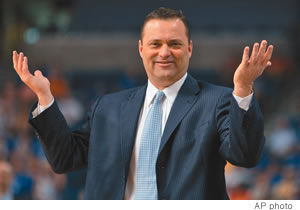Coaches Courting Talented Tweens

Wednesday - July 08, 2009
| Share
 Del.icio.us
Del.icio.us
|
No doubt it was a pleasant surprise for 15-year-old Kamalei Correa when he learned that Greg McMackin had a scholarship waiting should the high-schooler-to-be decide to play football at the University of Hawaii come 2013.
This promise comes a year after UH made the same offer to 13-year-old Reeves Koehler, who dazzled coaches at various camps even though the 6-foot-3-inch, 298-pound adolescent had yet to play a game of organized football because he had always been too big to play Pop Warner. The Correa announcement was obviously good news for his family, which has expressed humble appreciation for the offer, and fans who can take comfort in knowing the current coaching regime is pressing hard to acquire future talent.
But while the reviews are good and everyone is saying all the right things, one does have to wonder whether making such offers is proper for McMackin or any college coach.
McMackin could be forgiven for becoming enamored with such young athletes. Koehler bench-pressed 225 pounds 12 times, ran a 5.5 40 and posted a broad jump of 7 feet, 6 inches.
Correa, his future Saint Louis teammate, rings the bell at 6-foot-1 and 232 pounds, and is the younger - and still growing - brother of former UH defensive end La’anui Correa and current Warrior defensive lineman Hoku Correa.
Coaches who let local talent escape soon find themselves unemployed.
McMackin, like all coaches, is pressed by the unrealistic expectations of alumni and fans who demand quick and plentiful victories, and university leaders who lack the courage to remind boosters that wins aren’t the final evaluator of athletic success.
The Warrior head man is hardly alone when it comes to getting an early jump on recruiting. In fact, he’s kind of late to the party. In 2006, USC basketball coach Tim Floyd secured a commitment from middle-schooler Dwayne Polee Jr. Floyd mined the eighth grade the following year by offering a deal to Ryan Boatright.
In 2008, it was Kentucky’s turn. Former Wildcats basketball coach Billy Gillispie offered Michael Avery a full ride even though he had yet to choose a high school. Avery won’t be able to play for the Wildcats until 2012, and it’s anyone’s guess who he’ll play for since Gillispie was canned in March.
NCAA rules forbid coaches from initiating contact prior to June 15 of the student’s sophomore year. That, of course, does not prevent coaches from talking to players and parents should someone else make the first move. Often it’s a middle man working on behalf of the coach or a family member who makes the introductions. Howard Avery, Michael’s father, introduced himself to Gillespie at a tournament and later called to chat about his son’s future. So the question is not whether these guys are violating NCAA rules, but if they are walking an ethical tight rope that leans toward the side of inappropriate behavior while placing added pressure on young athletes.
For all the headlines and hopes these early offers garner, there is nothing that binds the university or the athlete to the deal. Most coaches, on average, won’t be around when these athletes graduate high school, and that heaps added pressure upon the player and the new staff. Such a precarious arrangement became publicly ugly a year ago when Boise native Daniel Smith brought a suit against UH for allegedly breaking a scholarship agreement. Smith claimed he was offered a deal by former defensive line coach Jeff Reinebold, and that he was told not to entertain offers from other schools, only to have his later calls ignored by the staff and then the offer outright rejected following June Jones’ departure for Dallas.
Another problem with such promises is it can ruin reputations and make future recruiting difficult. Published reports have McMackin promising to honor the pledge he made to the Correa family, but the coach is going to be put in a very bad position should the young recruit get injured, fail to reach his potential, or a greater need arises elsewhere.
Such early adulation also does nothing to temper the spotlight of fame or the feelings of entitlement that far too many athletes boast. As it is, too many high profile athletes treat their signing day as if they happened upon a Mideast peace solution instead of what it is - the official announcement of the annual semi-informed evaluation crap shoot.
Recruiting by itself is a fairly dubious business of false promises, back-door criticism and self-grandiose affirmation. It doesn’t get any better with the inclusion of tweens.
E-mail this story | Print this page | Comments (0) | Archive | RSS Comments (0) |
Most Recent Comment(s):













